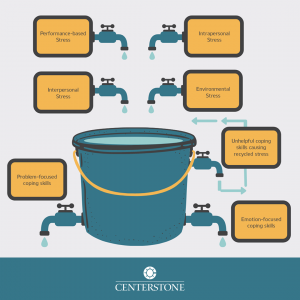Home / Health & Wellness Articles / Stress /
Good vs. Bad Stress

Most people want to live life as stress-free as possible. We try to stay away from situations that we know will lead to frustration and anxiety, but did you know that stress can be both negative and positive?
Stress that is characterized as negative is referred to as distress. Examples of common negative stressors are relationship problems, unemployment and injury. When something distresses you, it can lead to feelings of hopelessness about the situation. You begin thinking in “what-ifs” rather than working toward solving or coping with the problem.
On the other hand, there is also stress that can be characterized as good, called eustress. Examples of common positive stressors are starting a new job, taking a vacation, or learning a new hobby. When you feel eustress, you are motivated to perform well in the situation. You see the stressor as an opportunity and work to get the best possible results.
While there are stressors that can be considered positive or negative across the board, there are several that can be either or even both – it simply depends on how you process it. “Our thoughts can be the factor that determines if something is a positive or a negative stressor. If our focus is on the negative, then we view the event as negative,” says Evelyn McGee, Therapist at Centerstone. “Stress is a person’s chance to solve problems that exist. It is made positive when the person comes to a solution that solves or helps them cope with the problem.”
Processing Stress: Stress Bucket
It is important to acknowledge and think through your stressors to stay mentally healthy. The Stress Bucket is a visualization of stress that can help you process it better.

Types of Stress
When looking at stress through this bucket analogy, think of these stress types as the spigots that fill your stress bucket:
- Performance-based. This type of stress can also be referred to as Academic or Professional. Examples include having many assignments, disagreeing with your teacher or superior, and problems working with your peers.
- Interpersonal. Interpersonal stress comes from interactions with people in your daily life such as arguments with your significant other, feelings of loneliness, and having trouble making friends.
- Intrapersonal. Intrapersonal stress refers things within your own mind and body. This can include mental health challenges like anxiety, a poor diet, and worrying about money.
- Environmental. Environmental stress comes from changes or conflict within your surroundings. This might mean roommates arguing, moving to a new home, or having work that needs to be done on your car.
Coping Skills
These coping skills can be translated as the way you empty your stress bucket and become more or less at peace. Using helpful coping skills will help you process stress more positively.
- Unhelpful coping skills causing recycled stress. There are ways to handle stress that actually leave you unhealthier than when it first entered your bucket. This can look like self-medication, i.e., using drugs or alcohol to take your mind off your worries. It can also look like simply pretending that the problem will go away without doing anything about it. Processing stress in these ways prevents you from adequately coping or solving problems.
- Problem-focused coping skills. One healthy way to handle stress is working to resolve the things causing it. The way to solve the problem is dictated by the specific situation. If your stressor is conflict with a friend, you can try practicing communication skills to better manage the conflict. If you usually skip meals and drink too much coffee every day, you can try to implement a healthier eating plan. No matter the situation, solving the present problem will help.
- Emotion-focused coping skills. Another healthy way to handle stress is by seeking comfort. Some stressors, like the death of a loved one, are not problems that can necessarily be solved right away. In these situations, practicing mindfulness and having strong support systems will help the most. You can try to alleviate anxiety with mindfulness and breathing techniques. Connecting with others will also help, whether you talk to friends via phone or text, or spend quality time with family.
If you are looking for extra help with managing stress, Centerstone is here for you. Call 1-887-HOPE123 (877-467-3123) or visit out counseling services page to get connected with care.


